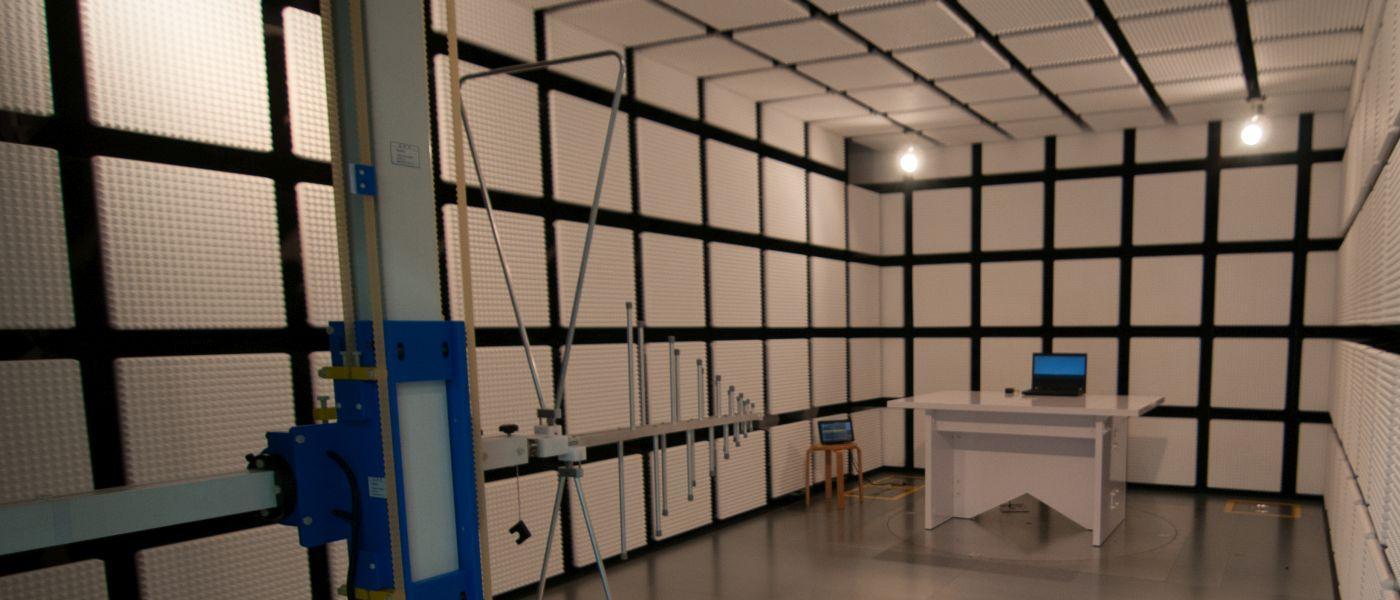
Kevin Beck is a legend in Lenovo. His knowledge of all aspects of the ThinkPad is well known to colleagues in Raleigh (North Carolina, USA), Beijing and everywhere in between. When Kevin agreed to talk about the hard tests of business laptops, we knew that he had a couple of funny stories. But we also knew that he would download us with technical information (for example, what is “electromagnetic noise”?), So first of all we started talking about zombies.
Hello! We know that you are going to talk about notebook tests, but let us immediately ask the only question that interests our readers: Will the ThinkPad survive the zombie apocalypse?Fine! Testing ThinkPad goes 24 years in real conditions, so tests with the zombies to hold are not yet included in the program.
So good. Here are some more scenarios: how does the ThinkPad cope with the waterspout from the Shark Tornado (Sharknado), the Burning Man Festival and - most importantly - one day in the high school office?Obviously, the most difficult test of the three will be the day at school. As I said, all ThinkPads undergo a variety of lab tests, including 12 military tests. We also have ThinkPad models for study that are tested even more. A tornado of sharks and the festival - little things compared to what a ten-year-old child does with a laptop.
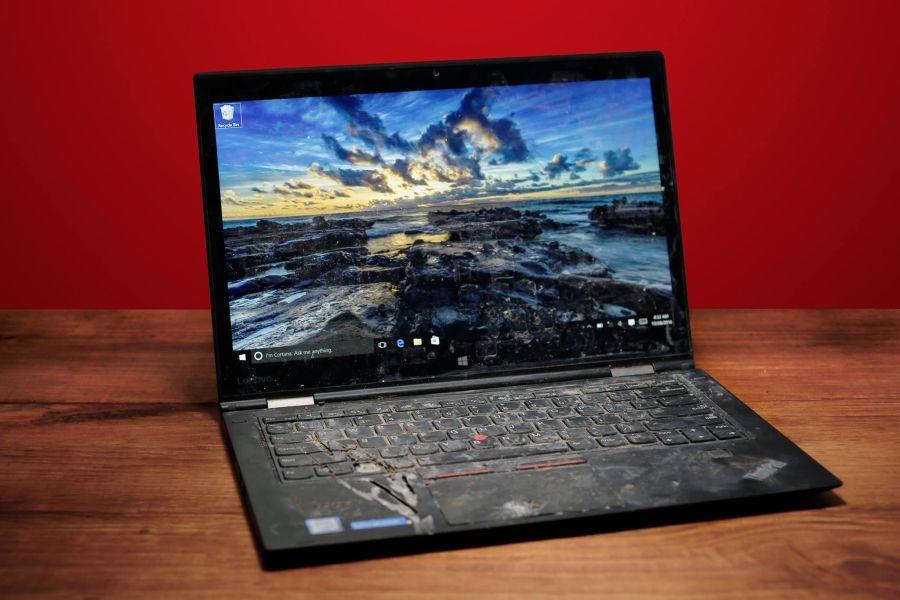 Without doubt. But let's be serious. We heard that there is a certain “philosophy” of developing the ThinkPad, which is already 24 years old. What is its essence and what advantages does it give?
Without doubt. But let's be serious. We heard that there is a certain “philosophy” of developing the ThinkPad, which is already 24 years old. What is its essence and what advantages does it give?Without going into “marketing,” I think most of the continued success of the ThinkPad lies precisely in this philosophy. Simply put, laptops must, through development, testing and solving trade-offs, be a great tool for any user task. Reliability, durability, functionality, design - these are all components of a successful laptop. ThinkPad is a versatile tool for those who need to do something. Our engineers think not only about what users will do on the ThinkPad, but what they can do with the laptop itself.
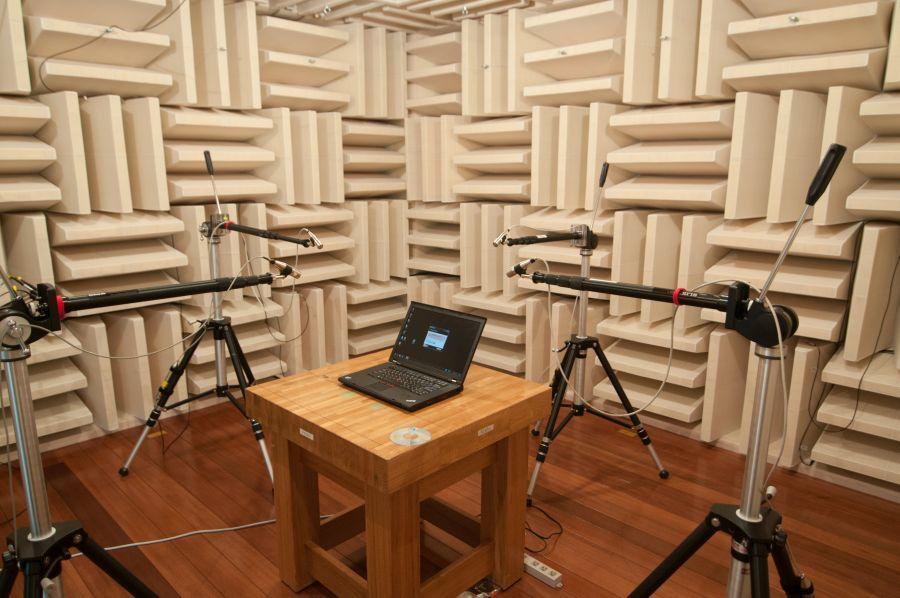 Clearly, laptops have a hard time. We always try to get through marketing exaggerations and understand what makes us different from the rest and does better. We do not want to categorically declare that the ThinkPad is more tenacious than the laptop A or B from our competitors. So why should the user choose our model instead of another manufacturer?
Clearly, laptops have a hard time. We always try to get through marketing exaggerations and understand what makes us different from the rest and does better. We do not want to categorically declare that the ThinkPad is more tenacious than the laptop A or B from our competitors. So why should the user choose our model instead of another manufacturer?ThinkPad is really more durable compared to the models that are usually called “durable” in stores. But this is not the only reason we think a person should choose our laptop. The point is to manage all aspects that are involved in a laptop. This with the minimum of compromise meets the needs of a large group of users. Some people need large 17-inch workstations, someone needs ultra-light carbon models weighing three pounds (1.3 kg). In the case of the ThinkPad, we do not make concessions when developing and testing any systems: they are different in design, but are checked according to uniform standards. It is this philosophy that allows you to determine what the ThinkPad should do and how.
It makes sense. We know that you lived in Japan and were in the Lenovo lab at Yamato many times (now in Yokohama). You even called it “a geek's paradise.” Describe for those who have never been there - what kind of laboratory is it?This is a divine place - at least for people like me. Imagine laboratories filled with laptops at various stages of development, rooms with engineering tools, equipment for testing. Many components, motherboards, fans, chassis, processors. You know, it's like toys! And the laboratory is led by the most loyal and meticulous engineers I have known for 20 years in this business.
 Drop test
Drop test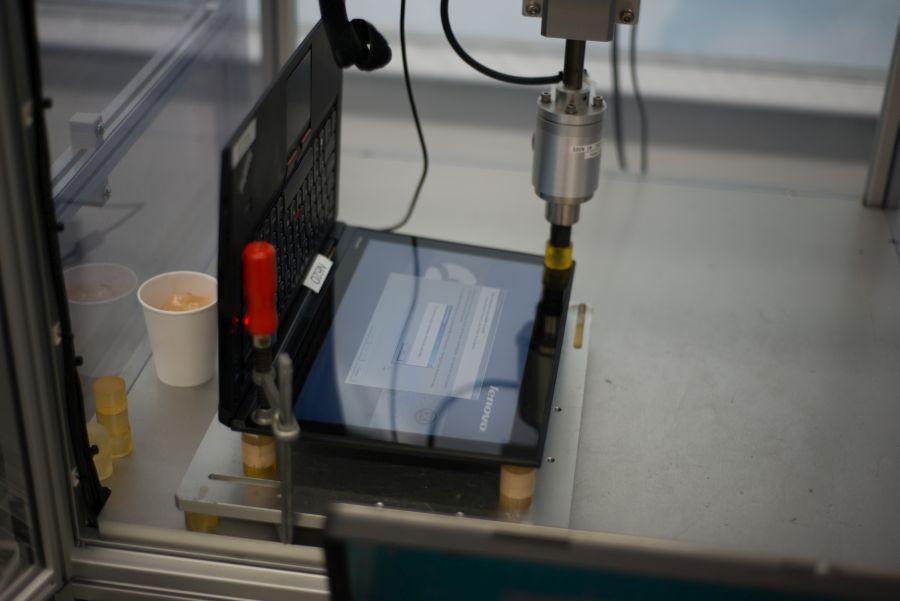 Screen stress testSounds wonderful. We are still trying to convince the boss to send us there. Okay, let's talk about the individual tests - terrible, brutal tests - that occur with commercial ThinkPad (T, X, L and P series). Do we understand correctly: there are 20 test procedures and 12 military methods? Reveal the secret: what are these tests?
Screen stress testSounds wonderful. We are still trying to convince the boss to send us there. Okay, let's talk about the individual tests - terrible, brutal tests - that occur with commercial ThinkPad (T, X, L and P series). Do we understand correctly: there are 20 test procedures and 12 military methods? Reveal the secret: what are these tests?People who were in the lab described it as a “horror room” for laptops. Military tests relate to heat, cold, damp, vibrations, mold, falls and so on. But the standard tests for the ThinkPad are even tougher. The screens bend, metal balls are dropped on laptops, models fall at the corners, they are shaken by mechanical arms, they are exposed to various vibrations.
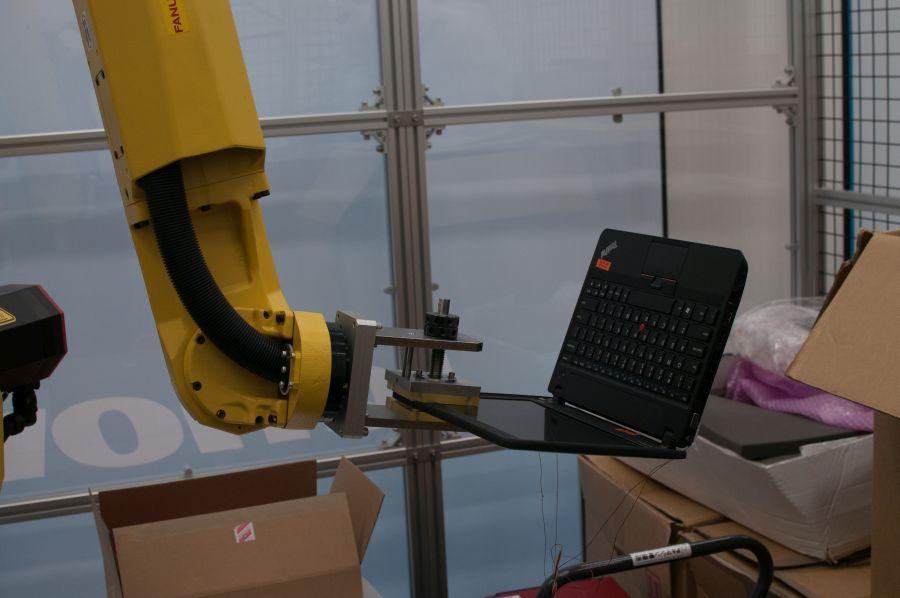 Hinge testGod, this is the worst nightmare of cheap laptops. Tell us about the tests of the display and hinges for mounting the covers.
Hinge testGod, this is the worst nightmare of cheap laptops. Tell us about the tests of the display and hinges for mounting the covers.All ThinkPad tested for 30 thousand cycles of opening-closing lids. They are fixed on a special mechanism, which not only opens and slam panels, but does so with different strength. Also, laptops are raised by a mechanical arm, imitating the grip and lift for the cover, not the base. We added this test a few years ago when we realized that some people take laptops in a completely different way than engineers intended.
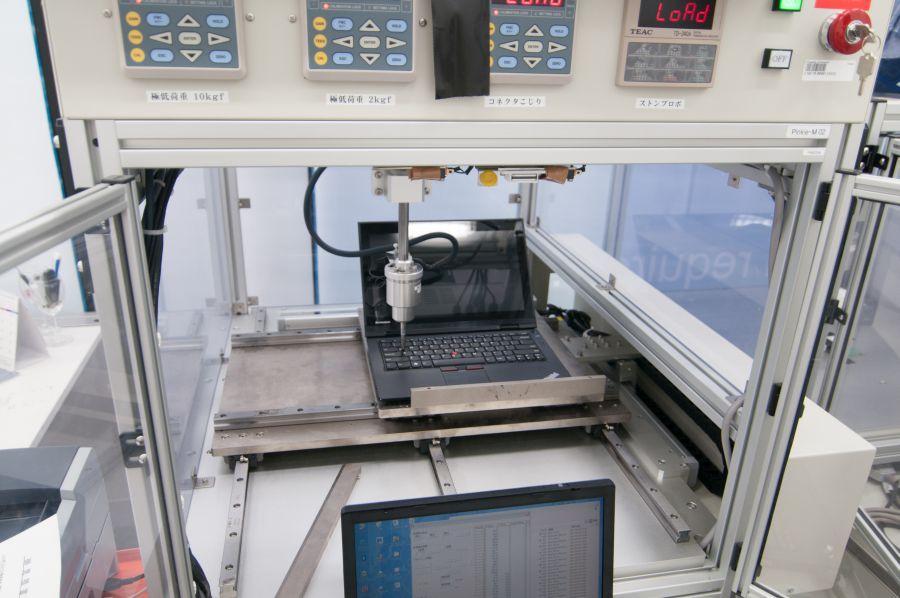 Keyboard testOnce you said that the keyboard test is very boring. Why is that?
Keyboard testOnce you said that the keyboard test is very boring. Why is that?He is similar to hypnosis: there is a mechanism that presses each key and determines the force of recoil. The device calculates how much effort is required to press a button and return it to its original position. It takes two minutes. For each key. Watching this is boring, but the test gives accurate information on all buttons. This is very important for us and our users.
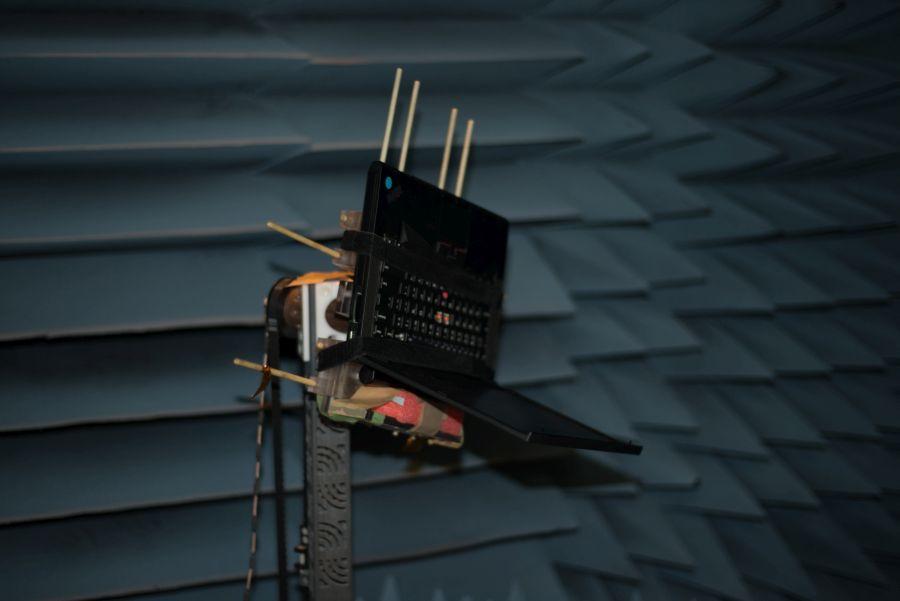 Wireless test
Wireless test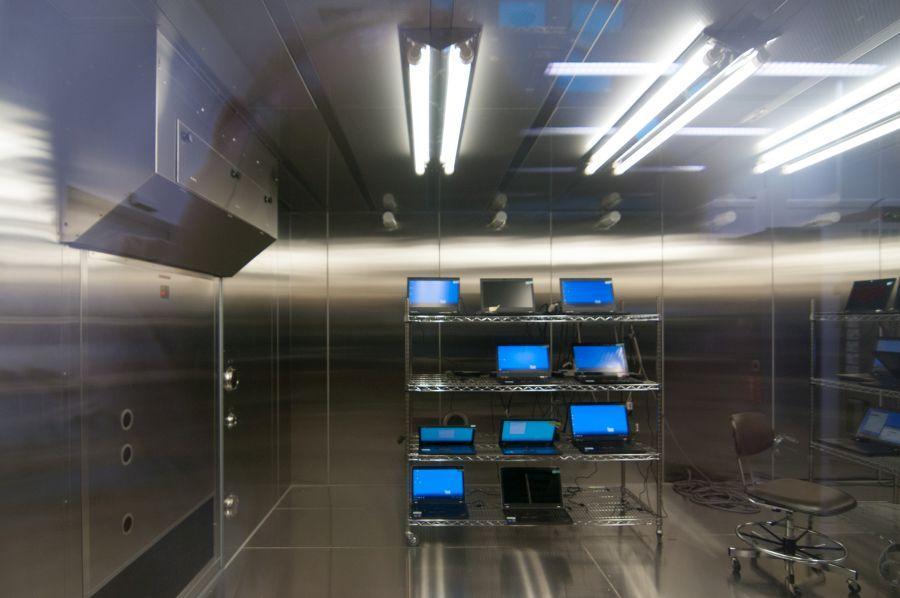 Environment testAnd what are the other tests?
Environment testAnd what are the other tests?Acoustic Noise Test - ThinkPad Test for Acoustic Noise Radiation
Drop test - repeated lapses of laptops to test the reliability of the design
Dust test - checking reliability with dust and sand
Electromagnetic noise test
Environment test - test for work in cold and heat
Stress test screen - checking the reliability of the laptop cover
Vibration test - withstand vibrations of different strengths
Wireless test - testing the operation of wireless interfaces in different conditions
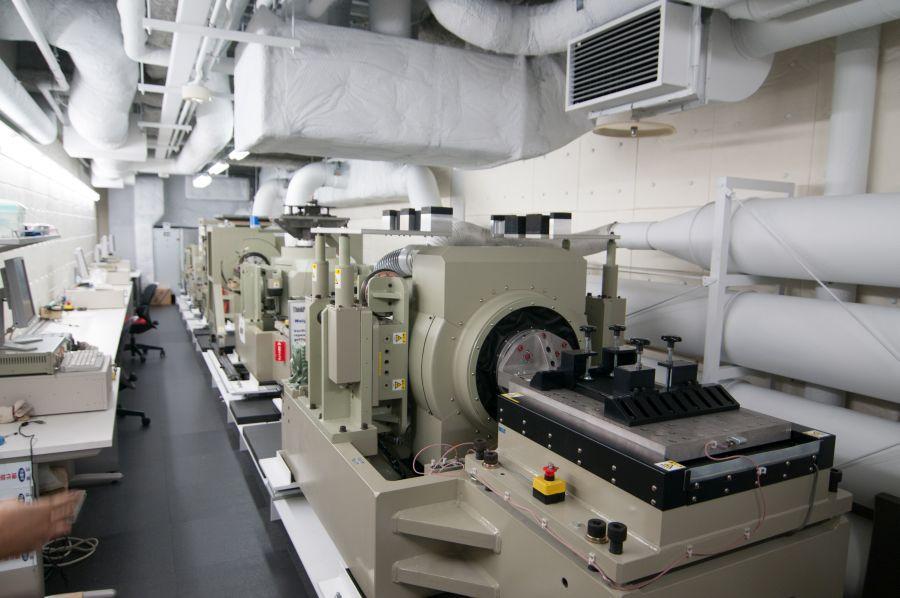 Vibration test
Vibration test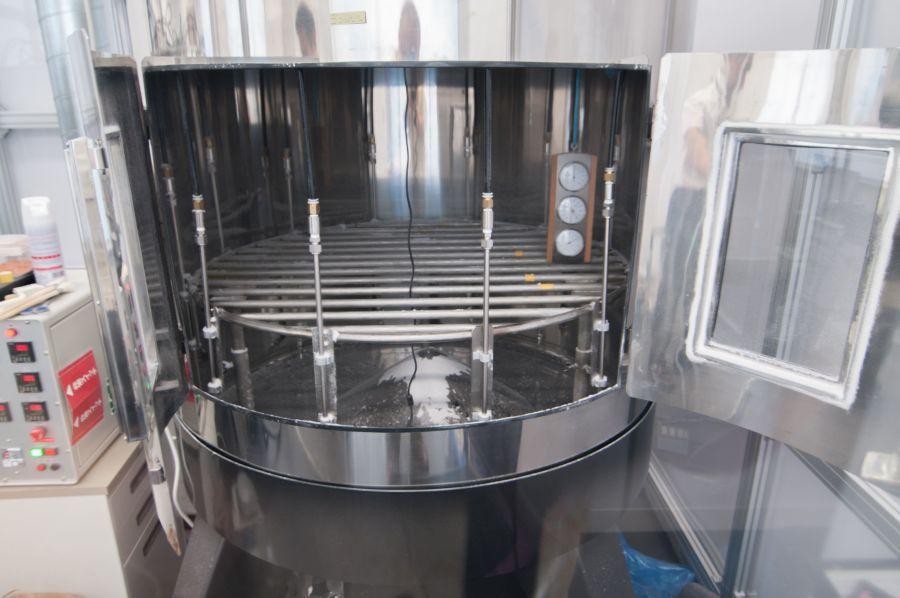 Dust resistance testIt seems that the “room of horrors” is not one - there are many more of them. You said that you spend a lot of tests not only on what has already happened with laptops, but also check for resistance to what may happen to them in the future. What does it mean?
Dust resistance testIt seems that the “room of horrors” is not one - there are many more of them. You said that you spend a lot of tests not only on what has already happened with laptops, but also check for resistance to what may happen to them in the future. What does it mean?I meant it when I said that we teach our engineers to think about what people can do with their laptops. 24-year observations have taught us that people always find unique ways to damage the ThinkPad. Part of the work of engineers is to analyze the data collected by us and improve testing in order to anticipate the emergence of a number of situations in real life.
Last question: how different are the people who were paid for by the employer with their laptops compared to regular customers?I think it can be argued that they care less about his safety. Can't imagine what we have sometimes seen (unless you are a car rental manager). People drop laptops from the stairs, leave them next to the working equipment and on the roofs of cars, and then leave with them, hide for holidays in the ovens and forget to get when they come back and start making cookies.
Someday we will write a detailed book about everything that happened to the ThinkPad, ok? Thank you for talking.